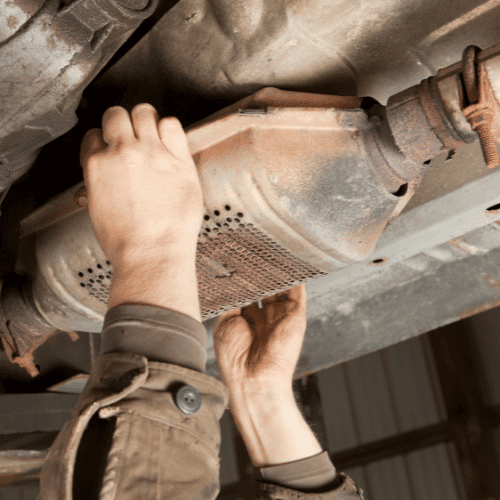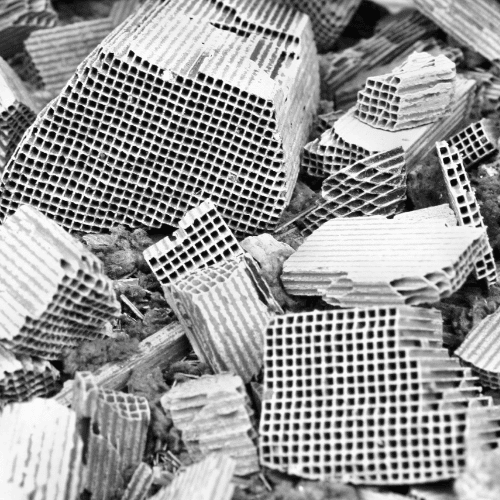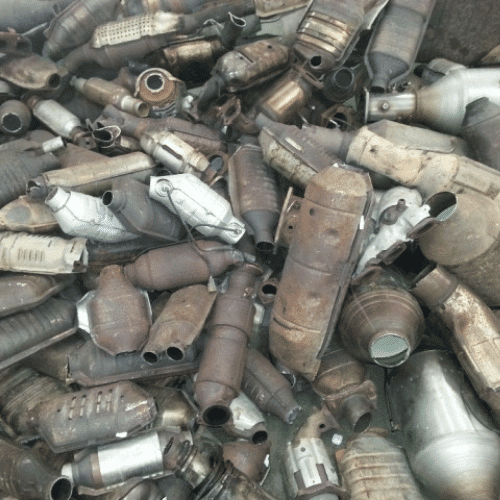If your car is malfunctioning, you might be unable to sell it. Accordingly, selling it for parts is ideal. Depending on your vehicle model, the catalytic converter is probably one of the most profitable parts to sell, even as scrap metal.
You might also be interested in replacing your existing cat converter. Well, whether you’re selling or seeking a replacement, the catalytic converter scrap price can go all the way up to $1500, depending on the part’s size and rarity.
What makes catalytic converters so valuable? Well, they are made from precious metals, and their functional use can also be quite high.
Read on to find out what price you can get, or have to pay, for a replacement or scrap catalytic converter.
- What Is A Catalytic Converter?
- How Do Catalytic Converters Work?
- Why Are Catalytic Converters So Expensive?
- How Much Does It Cost to Replace A Catalytic Converter?
- How Can I Check the Price of A Catalytic Converter?
- Scrap Catalytic Converters Price List
- Prices of Common Cat Converters
- How Do I Know When It’s Time to Replace My Catalytic Converter?
- How Do I Know If My Catalytic Converter Is Missing?
- How Can I Stop My Catalytic Converter From Being Stolen?
- Frequently Asked Questions
- Which cat converters have the highest scrap price?
- What cars are most likely to have their catalytic converter stolen?
- What app should I use to find the scrap price of a catalytic converter?
- What price can I get for my catalytic converter?
- Why are aftermarket converters so cheap?
- What trucks have the most valuable catalytic converters?
- How long does it take to steal a catalytic converter?
- Final Words
What Is A Catalytic Converter?

The primary function of a catalytic converter is to reduce emissions of harmful gases from the vehicle it is a part of.
Before cat converters began mass production in 1975, exhaust fumes — a byproduct of a vehicle’s internal combustion process — would be released directly into the air.
Together with the use of leaded gasoline (which persisted well into the ’90s) and carburetor injection, these harmful exhaust system emissions spelled a significant environmental hazard.
The development of the catalytic converter as we know it today began in the 1950s when Eugene Houdry. A French mechanical engineer with high expertise in catalytic oil refinement set about finding a way to combat the problem of such large amounts of harmful gases being emitted by vehicles.
By 1975, the cat converters were being mass-produced.
To eliminate harmful emissions for good, the Environmental Protection Agency set a new regulation that, to pass the emissions test, all vehicles built after 1975 were required to have a two-way catalytic converter.
The function of two-way catalytic converters was to eliminate unburned fuel hydrocarbons and carbon monoxide from the fumes of a vehicle’s exhaust system.
Later, the three-way catalytic converter was introduced, which was able to remove emissions of nitrous oxide. Today, it is illegal to drive a vehicle that does not have a good catalytic converter.
How Do Catalytic Converters Work?
Due to the lack of moving parts within a catalytic converter, its functioning is quite simple. As long as there are exhaust fumes and heat, a chemical reaction will occur within the cat converter with the help of three precious metals: platinum, palladium, and rhodium.
These are the chemical reactions that reduce exhaust fumes. Here’s how that works.
Inside the catalytic converter are two honeycomb meshes. One has a platinum and palladium coating, while the other has a coating of rhodium and platinum.
When exhaust fumes (including carbon oxides, nitrogen oxides, and carbon-hydrogens) enter the catalytic converter, they undergo a reduction process by the honeycomb mesh coated in rhodium and platinum.
Next, the fumes are subjected to an oxidation process through the second honeycomb mesh (coated in palladium and platinum), which results in chemical compounds which are much less harmful than the original chemical composition of the fumes.
3-way catalytic converters are at least 90% efficient, which is how they contribute significantly to the reduction of harmful emissions.
Why Are Catalytic Converters So Expensive?

If you’re looking for a cat converter replacement, your first concern is probably why a catalytic converter is so expensive. For that, we can thank the valuable metals from which it’s made: platinum, rhodium, and palladium.
These materials all have high per-ounce and per-gram prices. A catalytic converter makes use of 2-7 grams of palladium, 3-7 grams of platinum, and 1-2 grams of rhodium. When put together, the collective price of these valuable materials costs as much as $700.
Not to mention the function which it performs, which only adds to its value. For this reason, functioning catalytic converters are highly valuable, especially OEM models.
How Much Does It Cost to Replace A Catalytic Converter?
One of the reasons why replacing a catalytic converter tends to be a bit of a frustrating process is that the replacement cost can vary significantly.
The price depends not only on the condition of the cat converter itself but also the vehicle in which it was previously fitted (if it is a scrap part) or the vehicle it is meant for (if it’s new).
The quantity of precious metals presents within a catalytic converter depends upon the vehicle’s exhaust volume and the temperature it reaches. For example, pick-up trucks emit more exhaust gases than sedans.
And so, they require catalytic converters, which have a higher number of valuable metals capable of filtering out that much gas. So the replacement cost is accordingly higher. On average, a scrap catalytic converter is worth between $300 and $1500.
It’s also important to take into account whether your replacement cat converter will be a universal fit unit or a direct fit one. Many vehicles will accept a welded universal converter as a replacement, and you can get that done for less than $300 in most cases.
In the case of newer vehicles where the converter is incorporated into the exhaust manifold or the engine down exhaust pipe section, you’ll have to go for a direct fit converter. Needless to say, these are much less affordable, going up to as much as $2500, depending on the vehicle model.
And this excludes muffler shop labor costs (the fees you will have to pay to the mechanic), which will also vary depending on the time it takes to fit your vehicle’s replacement converter.
How Can I Check the Price of A Catalytic Converter?
There are a few different ways car owners can figure out how much they can sell their catalytic converter for:
Refer to Online Catalogs
The easiest way to find the price of a scrap catalytic converter is to consult an online catalog or table. These are usually published on the websites of recycling companies. Some major recycling facilities and scrapyards are RR Cats, Ecotrade Group, and YS Catalytic Recycling.
Although the information you find on these catalogs will not be 100% accurate or vehicle model-specific, you can at least learn the ballpark catalytic converter scrap value for a group of vehicles. Or, you can:
Upload A Picture to Get A Direct Quote
Thankfully, the aforementioned recycling company websites have mobile apps of their own. All you have to do is upload a picture of your vehicle’s catalytic converter, and a support agent will give you a quote for it after estimating its value.
You can also check the databases of these websites to find matches of photos of your catalytic converter to determine its scrap value.
Cross-Check The Serial Number
To do this, first, you’ll have to inspect your cat converter carefully. Most of the time, the serial number is on the edges of the component. The serial number can be as short as 3 digits or as long as 12 and might also contain letters. Use the serial number to find the catalytic converter scrap value on an online database.
Next, enter the serial number in an online lookup like Converter Database. You’ll also find similar apps in the Apple App Store or Google Play Store.
Search Online Marketplaces
If you’re looking to buy a used catalytic converter rather than sell one, online marketplaces can help you in that endeavor. Chances are you’ll get one at a good price, as there are lots of people looking to be rid of their old catalytic converter.
Visit A Scrapyard
You might be surprised as they can be a willing buyer and might even offer you a good price.
Scrap Catalytic Converters Price List
The price of a standard catalytic converter varies greatly from country to country and depends largely on condition and origin.
Keep that in mind as you consult the following approximate catalytic converter price list:
| Catalytic Converter Brand | Scrap Value |
| Malibu Legal Lacrosse | $80 |
| Euro 4 High Performance | $60 |
| Large Chrysler | $100 |
| Air Tube | $100 |
| Regular PRE | $100 |
| SE Low | $190 |
| Mitsubishi Outlander 3 (Direct Fit) | $100 |
| Small Flow | $150 |
| AC/Thin Pipe BL | $190 |
| GM Medium | $250 |
| Standard Domestic | $230 |
| High-Grade Domestic | $280 |
| Foreign Small | $300 |
| GM | $320 |
| BL Thick Pipe | $350 |
| SE 5 Line | $340 |
| Foreign medium | $390 |
| SE medium | $390 |
| XBody | $400 |
| XL Foreign | $590 |
| SE 6 Line | $440 |
| SE High Grade | $870 |
Prices of Common Cat Converters
Toyota
For the latest Toyota Prius model, a new catalytic converter will cost between $1800 and $2000. For the RAV4, it’ll set you back $1300.
The scrap price of a Toyota cat converter is between $75 and $700.
GM
The GM catalytic converter cost will be in the ballpark of $100, while for a new one, it’ll be around $1000.
Jeep
For a new Jeep catalytic converter, prepare to pay between $1400 and $1500. When selling a Jeep cat converter as scrap, expect no more than $300.
Ford
A catalytic converter for the Ford-150 will cost around $1300, with labor costs landing around $100. So the total price you’ll have to pay is about $1400.
A cat converter for an F-250 will cost close to $2800. If you’re selling scrap, you can ask for around $850.
Duramax
A new Duramax catalytic converter will cost between $600 and $1000. A scrap converter will cost anywhere between $100 and $300.
Dodge
For Dodge Ram 2500s, a new catalytic converter will set you back around $3500. Scrap prices are slightly lower.
How Do I Know When It’s Time to Replace My Catalytic Converter?

Catalytic converters don’t last forever, and if yours is nearing the end of its life, there are a few warning signs. Wondering whether you truly need a replacement cat converter? Check for the following bad catalytic converter symptoms:
- An exhaust leak. The exhaust leak will occur either near the vehicle’s firewall or directly under its cabin
- A check engine light that is on (yes, the check engine light is there for a reason!)
- A rattling noise coming from under the cabin of your idling car
- A foul odor emanates from your car’s exhaust. This odor will make itself known while you’re driving, while the car is idling, or when you’re outside the vehicle
- A catalytic converter that is glowing red and/or hot to the touch
- Reduced acceleration or power in the vehicle.
What to Do Next
If you suspect that your car’s catalytic converter is not doing well or is due to be replaced, it’s important for you to take your vehicle to a mechanic immediately. Otherwise, you are likely to encounter one or more of the following problems:
- Lower fuel economy
- Engine damage
- Slow engine
- Engine failure.
Not only will you save yourself a lot of time, money, and stress by having your vehicle diagnosed, but it’s also important to note that driving a vehicle with a malfunctioning catalytic converter is illegal in some states.
So if you have a bad catalytic converter, get that checked immediately if you don’t want to fail your smog test.
How Do I Know If My Catalytic Converter Is Missing?
Unfortunately, the high catalytic converter price makes it one of the car parts most susceptible to being stolen. If yours has been stolen, you will know instantly after you turn the key in the ignition — just from the sound.
Because the parts of the exhaust are going to be disconnected, your car’s exhaust will emit an extremely loud sound. If this happens, turn the engine off and step out of the vehicle to inspect it.
If your catalytic converter is, in fact, cut, the exhaust’s back portion will fall down due to there being no connection.
How Can I Stop My Catalytic Converter From Being Stolen?
Not only are catalytic converters valuable, but due to having no safety system, they are accessible too, making them easy targets for thieves. Unfortunately, physically reinforcing the part is usually ineffective as most thieves tend to use angle grinders for the job.
For this reason, if you have an expensive vehicle or know that your cat converter has a high market resale value, we recommend choosing a smart parking spot for your car. This means parking your vehicle in an enclosed garage, secure car park, or an illuminated driveway.
Angle grinders are loud, and people are likely to hear them being used by thieves.
We also recommend using a fine-tuned car alarm that can detect when your car is being elevated on one side (which needs to occur for the thieves to get to your catalytic converter).
And finally, you can consider etching your license plate number into the body of the converter. This will make it difficult for thieves to sell the part on the black market. You might not get your part back, but at least the thieves will get what they deserve!
Frequently Asked Questions
Which cat converters have the highest scrap price?
Understandably, the catalytic converters of exotic cars are made with the most precious metals. And so they have the most expensive catalytic converters.
Among the more common cars, the Toyota Prius and Toyota Land Cruiser have relatively high cat prices. The Prius needs two catalytic converters for a small engine, and the Land Cruiser requires a very large catalytic converter.
What cars are most likely to have their catalytic converter stolen?
– Toyota Prius
– Honda Accord
– Honda CRV
– Honda Element
– Ford Econoline
– Ford F-250
– Ford Excursion
– Toyota Sequoia
– Toyota Tundra
– Toyota Tacoma
What app should I use to find the scrap price of a catalytic converter?
The best course of action when choosing an app to get a quote on your catalytic converter is to try multiple at once. In this way, you will be able to learn who is offering the best quote and go with that recycling company.
That said, the following recycling company apps have the best reviews:
– RRCats
– EcoTrade
– iScrap
– Belanger Converter Recycling
What price can I get for my catalytic converter?
As mentioned earlier, the scrap value of any cat converter depends on the type of converter, its origins, and what vehicle it’s meant for. Some aftermarket catalytic converters bring very low prices, while large foreign and domestic converters can be sold for hundreds of dollars, if not a thousand.
Why are aftermarket converters so cheap?
Aftermarket cat converters are cheap, which is why they have such a low resale value. Ranging between $50 and $200, the price of aftermarket converters will barely help owners cover the production cost, much less the number of precious metals used in its construction.
If you’re thinking of buying an aftermarket catalytic converter, we would definitely recommend going for an OEM option instead.
What trucks have the most valuable catalytic converters?
The catalytic converter of an F-150 truck can also be sold for around $300, making it a popular target for converter thieves. They are also very easy to steal. The F-250, F-350, and other heavy-duty Ford trucks are also at risk of being robbed of their catalytic converters.
How long does it take to steal a catalytic converter?
If the thief is skilled with an angle grinder, they probably won’t take longer than 1-2 minutes to remove the catalytic converter from a truck. In the case of a car, the process can take as long as 5 minutes, as the thief will also have to lift the car using one or two jacks.
Final Words
If you’re looking to sell your car for parts, selling the catalytic converter can prove to be quite profitable. Getting a scrap part as a replacement can also prove to be a good idea, given that the used converter is in good shape.
As we’ve seen, catalytic converter scrap price varies greatly depending on the make and model of the car, as well as the converter’s size and condition. Without this information, it’s pretty difficult to determine the scrap value using just guesswork.
This is why it’s best to use an online database where you can look up the converter price or submit a photo to get a quote.
Whether you’re buying or selling a catalytic converter, we wish you good luck!

